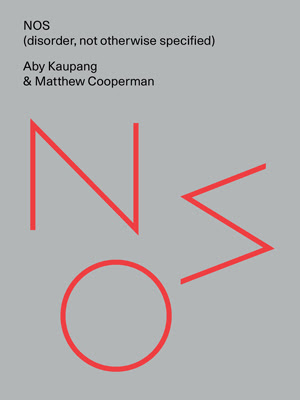JUDITH ROITMAN Reviews
NOS (disorder, not otherwise specified) by Aby Kaupang and Matthew
Cooperman
(Futurepoem Press, New York, 2018)
Sometime in the spring of 2016, I was lucky enough to be at
a reading by Aby Kaupang and Matthew Cooperman. Essay Press had recently
electronically published their chapbook Disorder
299.00, an extraordinary collaboration documenting their experience as parents
of a child with severe autism and frequent ill-understood life-threatening
conditions. Since then, Disorder 299.00
has grown into the full-length book NOS.
My writing these words — parents of, severe autism, life-threatening —
immediately sets up a narrative which we automatically fall into because our
culture sets it up that way. Kaupang and Cooperman do not fall into that
narrative. They precisely delineate the(ir) exact experience(s), unmediated by
normative narrative.
For example, a feeding tube:
a doctor strikes a hole
in our dtr’s abdomen
our mouths
the magnitude
close-up:
her mouth was closed
I thought it was a moment &
& a pre-moment
but the passing of her closure isn’t yet
Chapters are organized as floors on
a hospital, although they are not exactly: FLOOR ONE critical care; FLOOR TWO
diagnostics; FLOOR THREE general hospital; FLOOR FOUR neuro-psych ward; FLOOR
FIVE FOC [= father of child]; FLOOR SIX neuro-psych ward; FLOOR SEVEN MOC [= mother
of child]; FLOOR EIGHT discharged.
Some stanzas can be recognized by
anyone who has attended loved ones in a hospital:
they that wanted
coffee thousands must not have wanted
coffee
they that were
wanting watched from the insular
cart they that
wanted were
clairvoyants of sea tanks tubing and
cardiums
Some stanzas can be recognized by
anyone who has attended critically ill loved ones in a hospital:
the truth of the hospital
system is death prevention and sometimes death theft and the truth of the ER
more so so acuity decreases in proportion to the degree of
the field therapy in the hospital
then is polish is a strategy of low
tiers and sympathizers
And some are specific
to small children with extreme disorders not otherwise specified:
to sleep or to know
to eat or to know
to waiver to drug to measure to know
her twitches and
zaps eternal nights
our little girl in a study of studies
the floors the syringes the wires the tours
gather the doctors
together
Kaupang and Cooperman
are aware of the ethical conflicts of such a book:
MOC: Matthew feels
that to use one’s daughter as a “poetic” subject
is taboo. Forgive me
then for publicly processing. I embarrass.
Speaking from
experience, barely & newly, I pen out my exhaustions, my endless angers.
FOC: I forgive you nothing
for there’s nothing to forgive.
You are writing a boat to float upon,
a car with enormous wings
to give us horizon. Maya is real and worth
writing for.
[and then a footnote: “Unlike other forms of psychological disorders,
the core issue in trauma is reality,” Bessel Van der Kolk] [reviewer’s footnote
to the footnote: Van der Kolk is the author of The Body Keeps the Score, a highly recommended book about trauma]
They write
it is our ethical duty
to not escape
(note the quick change of font, one of many such subtle changes).
The poetry is accompanied
by medical documentation, medical charts, questionnaires which may or may not
be imagined (Patient _____ is in a
letter-like form), and occasional photographs: of Maya herself — from the
back, looking out of what seems to be a hospital window on an upper floor; from
the front, on a lawn, always looking like what she is, a child — and various
hospital surroundings.
Maya is not erased. She retains her particulars. Geese make her cry and climb you like a turret. She loves trains and
train videos, of which there are many… She laughs at parallels like lampposts
along a highway, and when there is clapping, clapping anywhere, she believes it
is all for her.
Towards the end we learn that this book of love and observation, so
generous to us, the readers who may or may not inhabit the land of FOC’s and
MOC’s of children with severe disorders NOS, has had readers who weren’t sure you loved your daughter who
“wanted to know more about her.” As if we
didn’t. NOS is a gift wrenched from a landscape difficult to see clearly. I
am grateful to Aby Kaupang and Matthew Cooperman for their painstaking work in
bringing it to us.
*****
*****
Judith Roitman’s
books are Roswell (theenk
Books, 2018) and No Face: Selected
and New Poems (First Intensity, 2008). Her poems have most recently
appeared in the tiny, December,
Rogue Agent, Galatea Resurrects, E-Ratio, The Writing Disorder, Otoliths,
Eleven Eleven, Horse Less Review, Talisman, and Yew. Her chapbooks include Slackline (Hank’s
Loose Gravel Press), Furnace
Mountain (Omerta), Ku: a
thumb book (Airfoil Press), and Two: ghazals (Horse Less Press). She lives in Lawrence,
Kansas.
